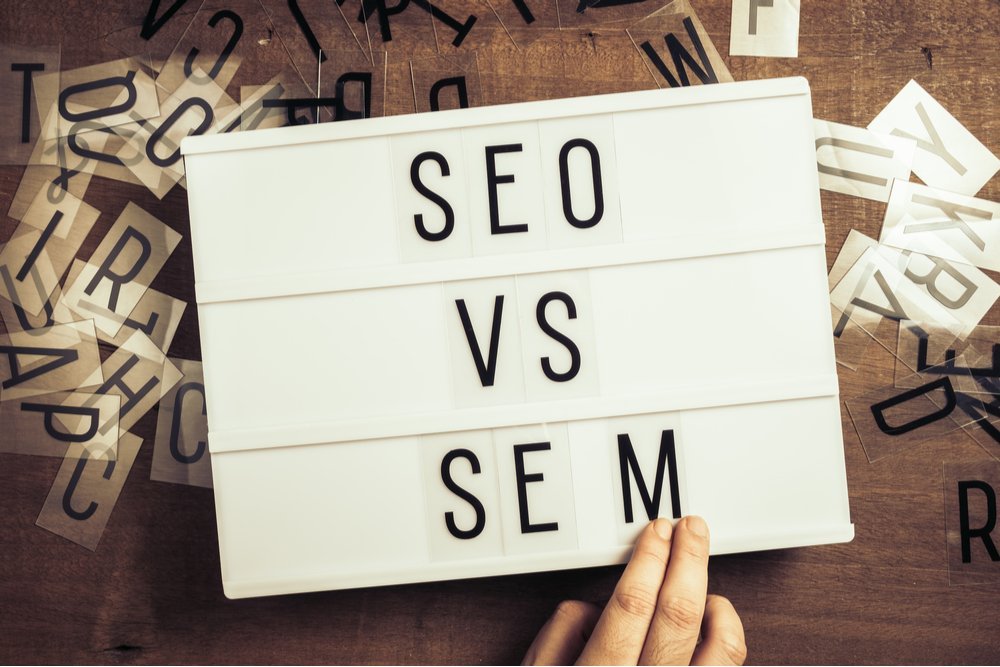This post originally appeared on tBL member Joshua Lyon’s blog Joshua Lyons Marketing Blog and is republished with permission. Find out how to syndicate your content with theBrokerList.

Whether you need a pair of socks or a local plumber, it’s likely you turn to the same place to find them: search engines. Digital marketing has grown increasingly search engine-centric in recent years, and new strategies are constantly emerging to help you boost your business up the rankings. Lately there’s been a lot of talk of SEO vs SEM – and whilst they’re both great tools you might wonder which of these is right for you? Let’s take a look at how these terms are defined and how they differ as strategies, and when you might need to prioritize one over the other.
SEO: Search Engine Optimization
If you’ve spent even a little bit of time exploring digital marketing opportunities for your business, then out of all the digital marketing jargon that gets thrown around, it’s likely that you’ve heard of SEO. Search engine optimization is the name of the game when it comes to getting your business in front of as many customers as possible.
SEO is all about tweaking your website and digital marketing strategy to boost your website up the rankings of Google, Yahoo and other search engine sites. “Businesses live and die by search engine optimization because those top results draw the most customers,” says Rebecca Collado, an expert at Origin Writings and Brit Student. “If your organization is languishing on page two of the search, nobody is going to find you.”
That means that SEO is vital to brand awareness, a key tool in your digital marketing arsenal. SEO cannot be ignored, but increasingly digital marketers are talking about something else – SEM. What is this, and is it overtaking SEO in the digital marketing hierarchy?
 SEM: Search Engine Marketing
SEM: Search Engine Marketing
As the power and influence of search engines grew in general, and Google in particular, SEO became increasingly dominant as a tool for brands reaching their audience online. Search engine marketing (SEM) seemed to diminish, as companies threw their budget at climbing the rankings through website tweaks and content.
However, SEM can afford businesses powerful results when it’s done right, and it encompasses a wide range of actions that SEO activities neglect. Primarily, these revolve around paid advertising such as pay per click ads and social media banners.
If your SEO game is subpar, then SEM is a way of levelling up your presence on the web. Think about a Google search – no matter who’s at the top of those search results, a paid ad takes the top spot overall.
What’s Right For You?
Trying to choose between SEO and SEM as a primary strategy for your digital marketing can be baffling, but ultimately the difference between these two paths is about the kind of traffic you drive to your website. Because SEO is about producing great content, interlinking with other websites and targeting the right keywords, it creates organic traffic – web users are naturally drawn to your site.
SEM, on the other hand, boosts inorganic traffic as you’re effectively splashing out to bring the clicks. SEM can be highly targeted and drive traffic up to your website faster than SEO, and it’s also independent of changes to the algorithm that can catch you out.
Are you enjoying this post? If so, be sure to subscribe for occasional email updates from our team!
A Combined Strategy
SEM is a great shortcut to greater traffic – but you can’t only rely on ads to bring views to your site. How often have you scrolled past the paid results yourself, drawn instinctively to the organically boosted results? Combining targeted SEM with a powerful SEO strategy will ensure that you bring an engaged audience to your business, and that you have the content to hold their attention.
Unfortunately, we don’t have unlimited marketing budgets. If you’re looking for the best return on investment, SEO can be highly lucrative. “By optimizing keywords across your site, producing a blog with great content and connecting with other high-value sites through linking, you can climb the rankings with little outlay,” says Anita Jackson, a sports blogger at Write my X and 1 Day 2 write “This might be the best bang for your buck, but it takes time.” Investing in SEM, on the other hand, can give you a quick hit, helping you bring traffic to your site without hours of SEO tinkering.
Wrapping Up
The world of digital marketing is innovative, creative and competitive. When you’re competing against hundreds of global brands for those lucrative top spots it’s essential that you fit together multiple pieces of the puzzle. Knowing when to implement SEM strategies on top of your SEO can help you get ahead of your competitors.
Combining targeted SEM with a powerful SEO strategy will ensure that you bring an engaged audience to your business ~ George Newton #SEO #SEM Click To Tweet

Author Bio
George J. Newton is a business development manager at Write my thesis and PhD Kingdom. He is passionate about digital marketing and enjoys the creativity of a sector that’s always innovating. He also writes for Next Coursework.

 SEM: Search Engine Marketing
SEM: Search Engine Marketing

